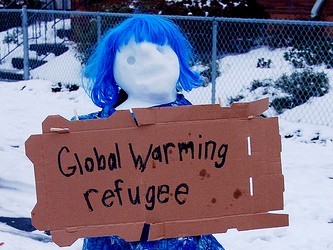 This snowlady needs to rewrite her sign if she wants to be 6.3 percent more convincing.Photo: Amy GoodmanThis piece was written by Tom Jacobs.
This snowlady needs to rewrite her sign if she wants to be 6.3 percent more convincing.Photo: Amy GoodmanThis piece was written by Tom Jacobs.
Are you convinced climate change is real? What about global warming?
Yes, that second question is redundant. But new research finds the two labels, which are widely used interchangeably, evoke remarkably different responses among self-described Republicans.
Writing in the journal Public Opinion Quarterly, a research team led by University of Michigan psychologist Jonathon Schuldt reports Republicans are far more skeptical of “global warming” than of “climate change.” In an experiment conducted as part of a large survey, the researchers found 44 percent of Republicans endorsed the notion that “global warming” is real, but 60.2 percent said the same of “climate change.”
In contrast, 86 to 87 percent of Democrats endorsed the reality of a changing climate, no matter which descriptive phrase was used. This means the partisan divide over the issue is either overwhelmingly enormous or potentially bridgeable, depending upon the terminology one uses.
Schuldt and his coauthors, Sara Konrath and Norbert Schwarz, inserted a question into the 2009 American Life Panel survey, conducted by the RAND Corporation. Most of the 2,261 panelists were recruited from respondents to the Survey of Consumer Attitudes conducted by the University of Michigan.
Half responded to this statement: “You may have heard about the idea that the world’s temperature may have been going up over the past 100 years, a phenomenon sometimes called ‘global warming.’ What is your personal opinion regarding whether or not this has been happening?”
The other half were presented with that exact same statement, except the words “going up” were replaced by “changing,” and the term “global warming” was replaced by “climate change.” All then reported their belief on a seven-point scale, from “Definitely has not been happening” to “Definitely has been happening.”
Overall, 74 percent of respondents either definitely or tentatively believed “climate change” was real, but that number went down to 67.7 percent when the “global warming” wording was used.
The researchers found this difference was driven almost entirely by self-described Republicans. For Democrats, the difference was nearly nonexistent, with 86.4 percent endorsing climate change and 86.9 percent acknowledging global warming. Among Independents, 74 percent endorsed climate change, while 69.5 percent acknowledged global warming.
Why do the two labels provoke such different reactions among a specific subset of the population? Schuldt and his colleagues propose some possible answers.
“Global warming entails a directional prediction of rising temperatures that is easily discredited by any cold spell,” they note, “whereas ‘climate change’ lacks a directional commitment and easily accommodates unusual weather of any kind.”
This is an important point: A separate study, which we recently described, found belief in global warming is greater among people who are experiencing warm temperatures at the moment the question is asked — even if they’re indoors.
“Moreover, ‘global warming’ carries a stronger connotation of human causation, which has long been questioned by conservatives,” the researchers add. “Both of these aspects make ‘global warming’ a more appealing frame for those who favor the status quo in climate policy.”
These findings point to a problem for pollsters, whose “choice of term seems somewhat haphazard” when surveying public opinion on the topic. Any polls that suggest swings of public opinion on this topic should be read with caution, taking note of the specific terminology that was used.
In addition, the findings have obvious implications for climate scientists and others who are trying to influence public opinion. They suggest “global warming” has got to go.
Either by design (the researchers found conservative think tanks prefer “global warming” to “climate change”) or because of how our minds processes the terms (“global warming” seems to lead to an expectation of noticeably higher temperatures here and now), the concept of “global warming” meets significantly more resistance than “climate change.”
What’s in a name? In this case, a more approachable way to frame an all-important argument.
This article was syndicated with permission from Miller-McCune, an online and print magazine that focuses on practical options for solving serious problems, particularly if the options are backed by quality research and evidence.




